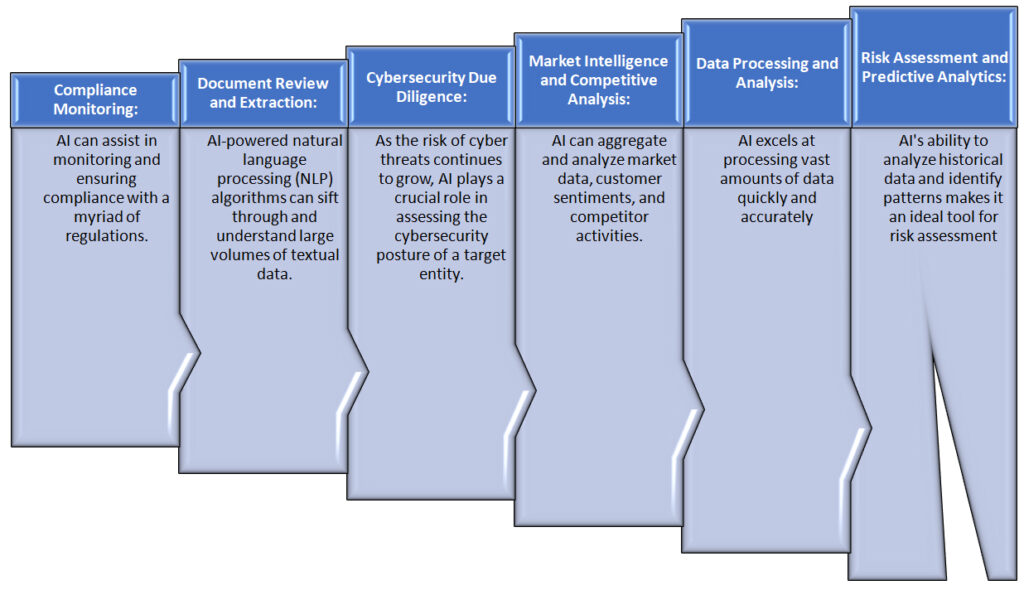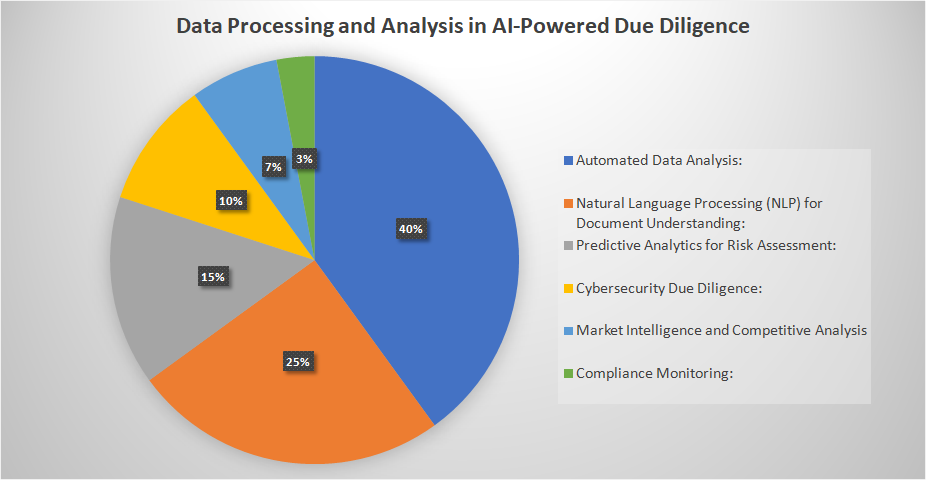
Where possibilities
begin
Gain new perspectives for your digital transformation. You can follow the blogs on this page to get latest information.
Automating Diligence: The Impact of AI in Streamlining Due Diligence Processes

In an era where information reigns supreme, the due diligence landscape is undergoing a profound transformation at the hands of cutting-edge technology. Welcome to “Automating Diligence: The Impact of AI in Streamlining Due Diligence Processes,” a white paper poised at the intersection of artificial intelligence and the meticulous art of due diligence. As organizations grapple with an ever-expanding volume of data, the imperative to conduct thorough investigations has never been more critical. This white paper embarks on a journey through the realm of AI-infused due diligence, unraveling the ways in which intelligent automation is revolutionizing traditional processes.
The convergence of artificial intelligence and due diligence marks a pivotal moment in the evolution of business practices. In the pages that follow, we explore how AI, armed with machine learning algorithms and advanced analytics, is reshaping the diligence landscape. “Automating Diligence” seeks to demystify the complexities, revealing how smart technologies are not only expediting the due diligence process but also enhancing the depth and accuracy of assessments. From risk identification to pattern recognition, this exploration delves into the myriad ways AI is becoming an indispensable ally in the pursuit of comprehensive due diligence.
The terrain where diligence meets automation, shedding light on the transformative impact of AI on the due diligence landscape. “Automating Diligence” is not just a glimpse into the future but a roadmap for organizations seeking to harness the full potential of AI in optimizing their due diligence processes. As the digital age propels us forward, discover how intelligent technologies are not merely tools but catalysts for a new era in due diligence practices.

Data Processing and Analysis:
In due diligence, where the examination of extensive datasets is paramount, AI can automate the analysis of financial records, legal documents, and other relevant information. This not only accelerates the due diligence process but also enhances the ability to identify patterns, anomalies, and potential risks.

Market Intelligence and Competitive Analysis:
Market intelligence and competitive analysis play pivotal roles in understanding the landscape of automating diligence, specifically the impact of AI on streamlining due diligence processes. As businesses increasingly embrace AI for diligence tasks, staying informed about market trends, emerging technologies, and competitor strategies becomes crucial. Market intelligence helps identify opportunities for innovation and potential gaps in the current offerings. Competitive analysis allows businesses to benchmark their AI solutions against industry rivals, enabling them to refine their strategies and enhance their competitive edge. In the realm of automating diligence, organizations must continually assess market dynamics and competitors’ advancements to ensure the effective integration of AI, thereby optimizing due diligence processes for efficiency and accuracy.
Document Review and Extraction:
Automating diligence processes through the integration of Artificial Intelligence (AI) has significantly transformed and streamlined due diligence procedures. AI technologies, such as natural language processing (NLP) and machine learning algorithms, play a pivotal role in document review and extraction, offering unparalleled efficiency and accuracy. These advancements enable organizations to sift through vast amounts of data, quickly identifying relevant information crucial for decision-making. The impact of AI in due diligence extends beyond mere automation; it enhances the depth of analysis, allowing for more comprehensive risk assessments and uncovering insights that might be overlooked in manual reviews. Moreover, the speed of AI-driven document review accelerates the overall diligence timeline, providing businesses with a competitive edge in fast-paced markets. By reducing the manual workload and mitigating the risk of human error, AI empowers professionals to focus on strategic aspects of due diligence, fostering better-informed decision-making and ultimately enhancing the effectiveness of the diligence process.
Compliance Monitoring:
Automating diligence processes through the incorporation of Artificial Intelligence (AI) has ushered in a transformative era for compliance monitoring, particularly in streamlining due diligence procedures. AI technologies, such as machine learning and natural language processing, bring unparalleled efficiency and accuracy to the monitoring of regulatory compliance. By automating the analysis of vast datasets and intricate legal documentation, AI enables organizations to ensure adherence to complex regulatory frameworks. This not only expedites the identification of potential compliance issues but also enhances the precision of monitoring efforts. The real-time capabilities of AI-driven compliance tools significantly reduce the margin for error and provide a proactive approach to risk mitigation. As a result, businesses can navigate intricate regulatory landscapes more effectively, fostering a culture of continuous compliance and demonstrating a commitment to ethical business practices. The impact of AI in automating diligence processes is not just about efficiency gains; it’s about reinforcing a robust framework for regulatory adherence and risk management in an ever-evolving business environment.
Risk Assessment and Predictive Analytics:
The integration of Artificial Intelligence (AI) in due diligence processes has brought about a paradigm shift in risk assessment and predictive analytics. AI’s advanced algorithms and predictive modeling capabilities empower organizations to conduct more robust risk assessments by automating the evaluation of complex data sets. Through the application of machine learning, AI systems can analyze historical patterns and current trends, offering predictive insights into potential risks associated with business ventures or transactions. This not only expedites the identification of red flags but also enhances the accuracy of risk predictions. By automating diligence processes, AI enables real-time risk monitoring, providing organizations with a proactive approach to mitigating potential threats. The predictive analytics capabilities of AI contribute to more informed decision-making, allowing businesses to navigate due diligence with a heightened awareness of the risks involved. Ultimately, this streamlined approach to risk assessment enhances the efficiency and effectiveness of due diligence processes, reinforcing organizations’ ability to make well-informed and strategic decisions.
Conclusion:
In conclusion, the integration of Artificial Intelligence (AI) into due diligence processes has emerged as a transformative force, fundamentally reshaping the landscape of risk assessment, compliance monitoring, data processing, and analysis. The impact of AI in streamlining due diligence is multi-faceted, offering unprecedented efficiency, accuracy, and depth of analysis. By automating the review of vast datasets and complex legal documents, AI significantly expedites the diligence timeline, allowing organizations to navigate markets with agility and precision. The predictive analytics capabilities of AI contribute to a more proactive risk management approach, enabling businesses to identify potential threats in real time and make informed decisions. Moreover, AI’s role in compliance monitoring ensures adherence to intricate regulatory frameworks, fostering a culture of ethical business practices.
Beyond the immediate gains in efficiency, the incorporation of AI in due diligence empowers professionals to focus on strategic aspects of decision-making, enhancing the overall effectiveness of the diligence process. As industries evolve and data complexities increase, the value of AI-driven automation becomes even more pronounced. Organizations that embrace this technological shift are not only positioned to achieve operational excellence but are also better equipped to navigate dynamic business environments with resilience and foresight. In essence, the impact of AI in streamlining due diligence processes transcends mere automation—it represents a catalyst for innovation and a cornerstone for building a robust foundation for future business success.
At DCirrus, we are working closely with professionals involved in conducting due diligence on a regular basis, exposing our customized AI solutions to various ongoing deals to enable them to work efficiently and close the due diligence process within the time frame agreed with their clients and save cost.
Latest Posts




